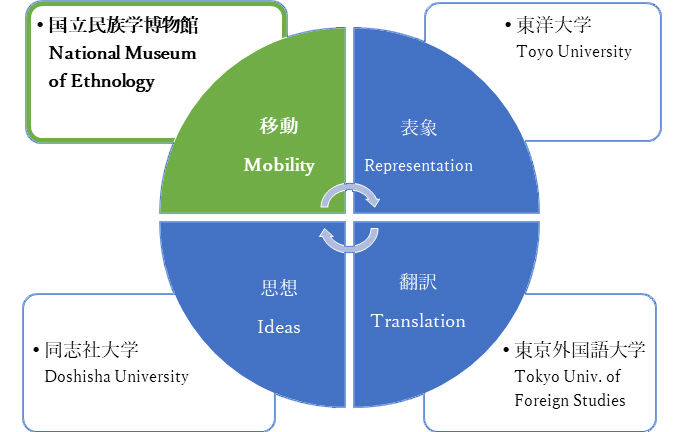国立民族学博物館グローバル地中海地域研究拠点は、大学共同利用機関法人人間文化研究機構のネットワーク型基幹研究プロジェクト「グローバル地域研究推進事業」の一つである「グローバル地中海地域研究プロジェクト」の中心拠点として、2022年4月に国立民族学博物館に設置されました。東洋大学アジア文化研究所、同志社大学都市共生研究センター(MICCS)、東京外国語大学アジア・アフリカ言語文化研究所の拠点とともにプロジェクトを進めます。
本プロジェクトは、地中海を取り囲む諸国を、北は「ヨーロッパ」、南は「中東・北アフリカ」として分断する既存の地域研究の枠組みを脱構築し、「地中海地域」としての歴史的・文化的な関係性を包括的にとらえるアプローチを探求します。また、地中海は内海であるものの、西に航海すれば大西洋の先にアメリカ大陸、南東のスエズ運河を経由して紅海から東アフリカやインド洋と繋がっています。一方、シルクロードは中央アジアまで続いています。こうした地理的空間を念頭に、17世紀から現代までの地中海を介したグローバルな人・モノ・知識の往来について、超地域的かつ学際的アプローチを援用して考察することで、新しい地域研究の構築を目指します。
民博拠点のテーマは「移民と交易によって形成される『地域』」で、鍵概念は「移動」です。人とモノ、知識が移動することにより特定の空間が切り取られ、「地域」として想起される契機や仕組みを考察します。
Global Mediterranean at the National Museum of Ethnology (MINPAKU) is a six-year working group project funded by the National Institutes for the Humanities (NIHU). Our partner institutions are Toyo University's Asian Cultures Research Institute, Research Institute for Languages and Cultures of Asia and Africa at the Tokyo University of Foreign Studies, and Doshisha University's Research Center for Multiculturalism and Intersectionality in Complex Cities (MICCS).
The project aims to formulate new approaches to area studies by examining the global flow of people, goods, and knowledge through the Mediterranean Sea from the 17th century to the present day. There are two main objectives. First, to deconstruct the existing framework of area studies which divides countries surrounding the Mediterranean Sea into “Europe” in the north and “the Middle East and North Africa” in the south. We explore the Mediterranean as a discursive space that represents this region as a unique civilization with shared values and cultures. Second, although the Mediterranean Sea is an inland sea, it is connected to the Americas beyond the Atlantic Ocean if one sails westward, and to East Africa and the Indian Ocean from the Red Sea via the Suez Canal to the southeast. That will bring us to Central Asia by following the Silk Road. The Mediterranean has therefore always been global. Our focus is on “modern” globalization, which is characterized by an exponential increase in the mobility of people, goods, and knowledge. Anthropologists have studied migration and historians have studied trade, but the ways in which such movement itself shapes people’s geographic imaginations awaits a full exploration.

